Jockey Club’s Philanthropy for Better Cities Forum continues to gather insights for metropolitan social solutions
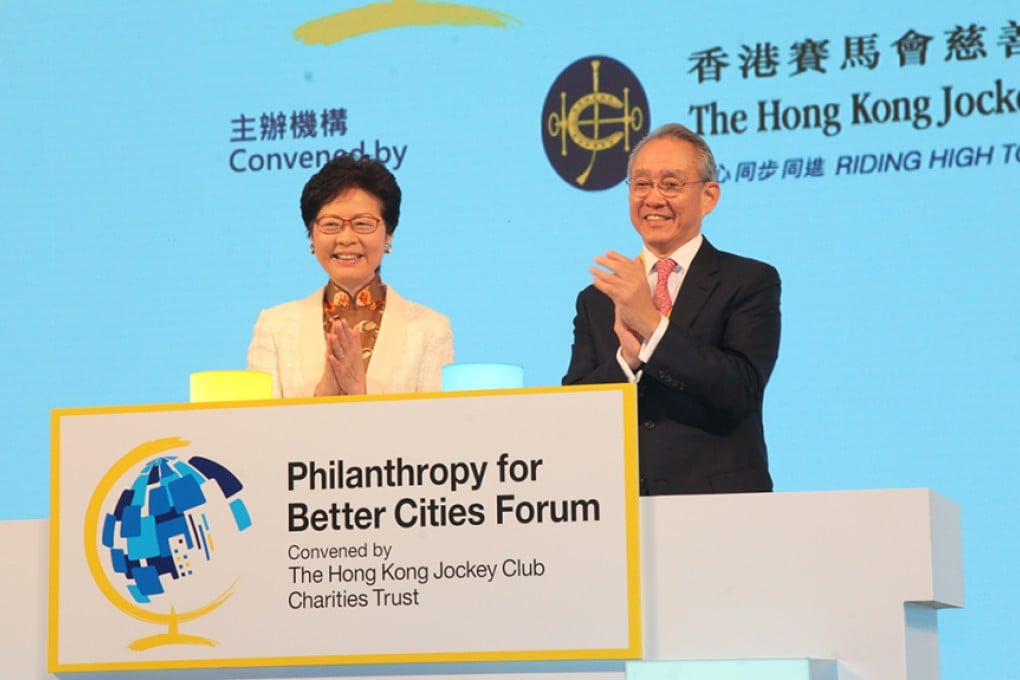
[Sponsored Article]
The Philanthropy for Better Cities Forum (The Forum) came to a successful conclusion at the Hong Kong Convention and Exhibition Centre on 21 September. Convened by The Hong Kong Jockey Club Charities Trust, the event was attended by some 1,400 local and international delegates, and focused on the role of philanthropy in addressing serious metropolitan social issues of the 21st century.
With half of the world’s population living in cities, and that figure expecting to increase to two-thirds by 2050, effective public health, education, housing, transport, and the environment are all vital for any strong and robust city. Seeing the increasing urgency, the Club’s Charities Trust first launched the Forum in 2016. Since then, this first such forum to be held in the Asia Pacific region continues to serve as a philanthropy hub for local and international philanthropists, social entrepreneurs, policymakers, opinion leaders and academics to come together to decide what are the right things to do in metropolitan philanthropy.
“At the Jockey Club we strongly believe in the power of partnership,” the Club Chairman Mr Anthony W K Chow noted in the opening speech. “Working with the Hong Kong SAR Government, NGOs, academia and service providers, we both support and initiate responses to present and emerging social needs”, he continued, reflecting on the objective of the Forum. “We hope these discussions will provide you with fresh insights which you can apply within your own field of operations.”
Also officiating at the opening ceremony was the Chief Executive of HKSAR, the Hon Mrs Carrie Lam. She expressed her gratitude to the Club for organising the Philanthropy for Better Cities Forum, and pleasure to address the audience who came from all over the world, from many professions, interests and backgrounds, all with a passion for building better cities.
Exploring the city’s needs in five main themes
67 prominent speakers shared their inspiring ideas in the two-day Forum centering on five main themes: Leveraging the Market, Sustainable Development, Maximising Impact, Youth & Creativity, and Health & Well-being.
The all-encompassing Forum had several sessions drawing attendees’ close attention and even active participation. For example, the political philosophy Professor Michael J. Sandel from Harvard University engaged the audience with his Socratic moral debate in the Keynote Address, challenging the limits of markets in delivering social good.
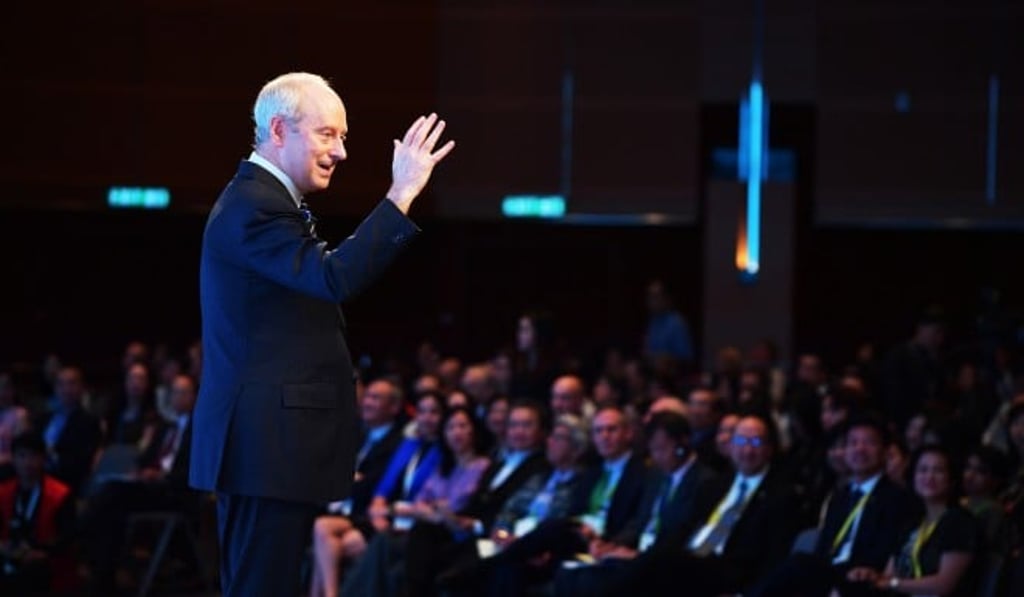
“Are there some things that money simply should NOT buy?” Starting with this simple question, Professor Sandel led the audience to discuss scenarios such as paying criminals to attend classes, and then rewarding them with cash payments monthly if they had not re-committed a crime. Or paying the obese to lose weight and thus save the government future medical costs.
The esteemed professor used these controversial examples to discuss the merits and problems of using money to drive impact and demonstrated that such tools may not be necessarily neutral. Meaning they may have unhelpful side effects. He pointed out that, as a result, there is a need to assess whether the use of a particular method to create good is creating a genuinely better society.
Exchanging ideas from different sectors
On the other hand, two Nobel Laureates, Professor James J. Heckman from the University of Chicago and Professor Muhammad Yunus also came together in Day 1 Closing Dialogue to give valuable opinions about the future of solving social issues.
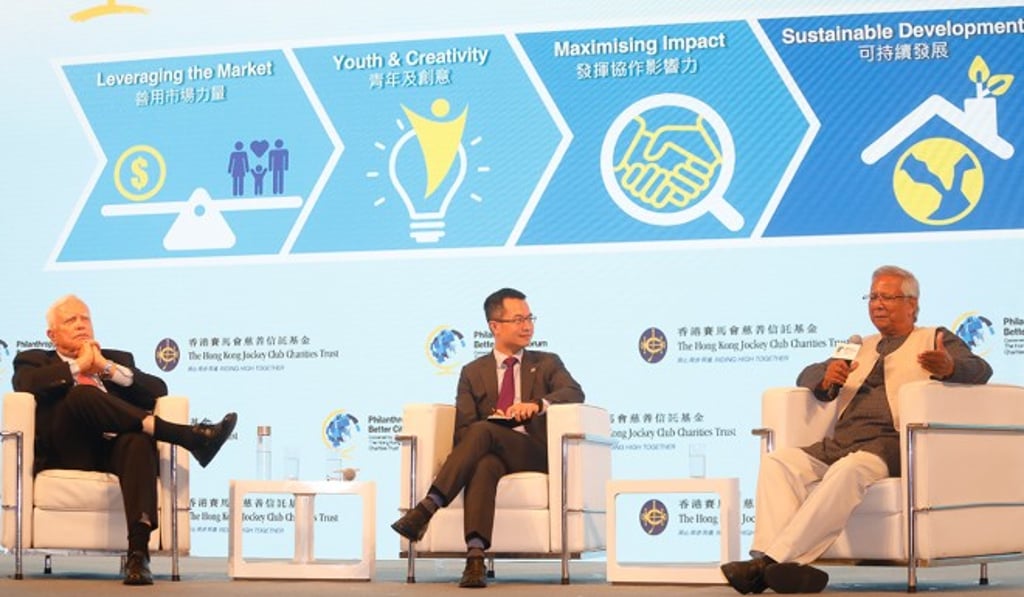
Professor Heckman’s recent research promotes early intervention in childhood with disadvantaged background to deliver large value returns later for both the individual and the society; while Professor Yunus launched a microcredit movement in Bangladesh that has since improved millions of poor people’s lives and demonstrated the bankability of such people, who had previously been written off as valueless customers.
Although the two speakers’ focuses of work are fundamentally different, each of them shared the same goal—to create a better society. They both identified technology as the key to address social issues. Professor Yunus invited philanthropists to try out new approaches and to be ambitious with their goals. Professor Heckman echoed Yunus’ thoughts and was optimistic for the role of technology in socio-economic outcomes. But he also pointed out that we should put some checks and balances in place to ensure the proper use of technology.
The other highlight of the Forum was the closing plenary session, where gold-medal winner Michael Phelps and former NBA player Yao Ming shared their experiences in setting up charity foundations with the Club’s CEO Winfried Engelbrecht-Bresges, Founder of Magic Bus Matthew Spacie and President of Hong Kong Tennis Association Philip Mok.
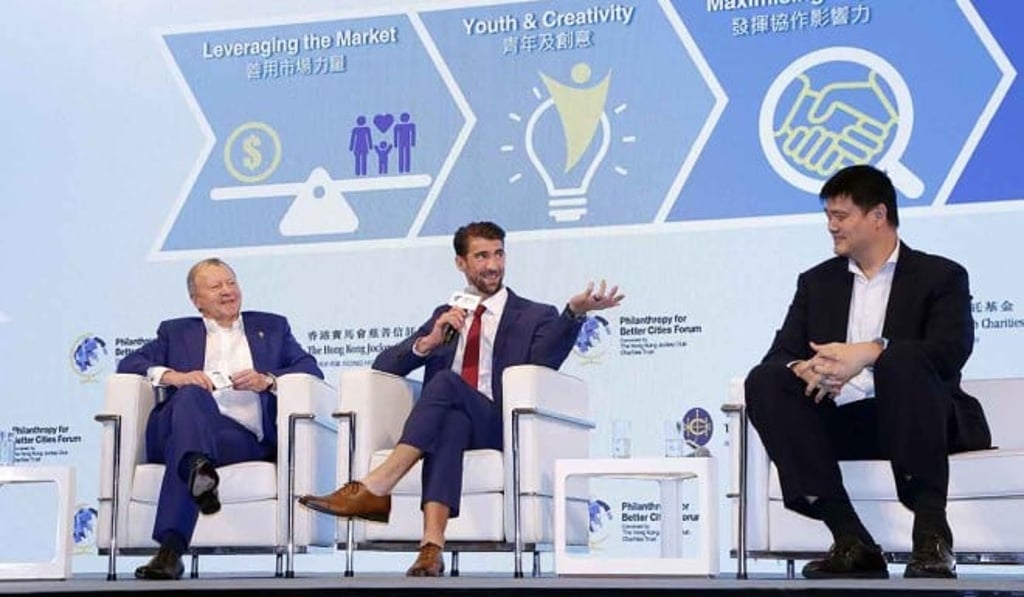
Phelps set up Michael Phelps Foundation after his stellar success at the 2008 Beijing Olympics, to teach children to swim. He said the foundation, as it turns out, not only teaches kids to swim, it also helps them to overcome their fears, doubts and obstacles by gaining self-confidence through swimming.
Yao also set up The Yao Foundation in 2008, when he read about the Sichuan earthquake. The foundation builds schools in the area to help children recover from the disaster. So far it has set up over 500 schools, and offered programmes to 90,000 students. Both athletes firmly believed that sport brings both confidence and happiness to kids, which is an excellent way to create positive and lasting social changes.
Engelbrecht-Bresges joined the sharing and said sports is a promising platform for creating a better community. He noted that role models in sports are particularly useful, and encouraged all budding sportspeople to be more proactive about their role in giving back to the society.
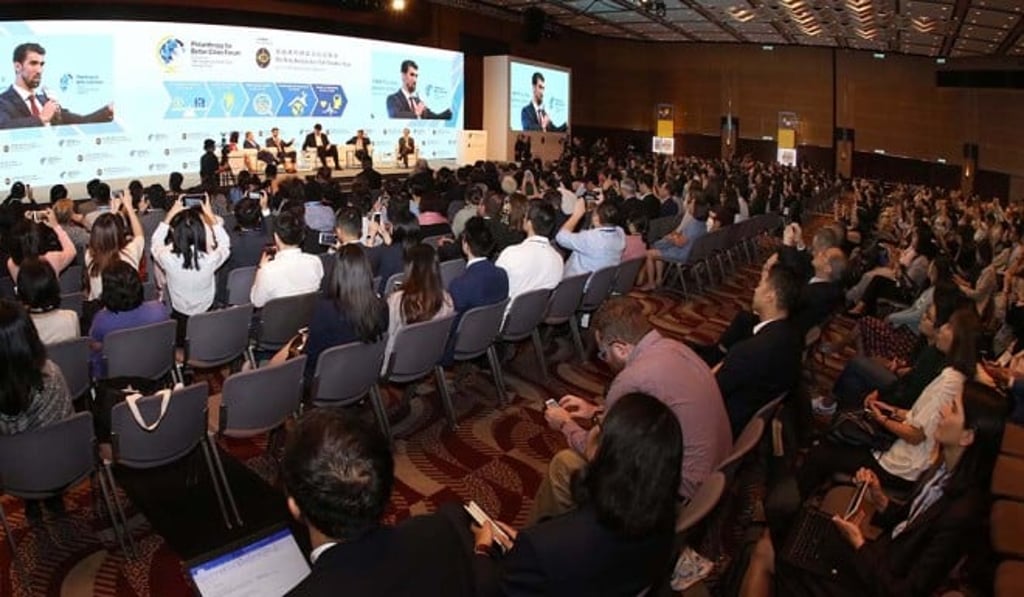
Some other leading speakers in the Forum included HKSAR Government Chief Secretary for Administration Matthew Cheung Kin-chung, Secretary for Labour and Welfare Dr Law Chi-kwong, and Secretary for Innovation and Technology Nicholas W Yang; Convenor of the Non-Official Members of the Executive Council Bernard Chan; Chief Executive of the Hong Kong Monetary Authority Norman Chan; Dean of Institute for Philanthropy of Tsinghua University Professor Wang Ming; Director of Bill and Melinda Gates Foundation Robert Rosen, and President and CEO of The Kresge Foundation Rip Rapson.
The Forum ended on a high note with a mass round of applause from the audience. Speaking at the closing ceremony, Club Chairman Anthony W K Chow emphasised, once again, the importance of partnerships and collaboration in philanthropy. Said Chow, “At the Jockey Club our intention is to carry forward the strong partnerships we have forged with the Government, academia and NGOs as we work towards the betterment of our society. We also intend to carry on the dialogue, in particular to share new ideas and fresh perspectives with the NGO community here in Hong Kong.”